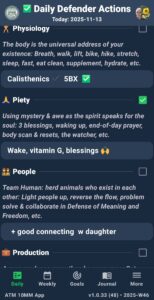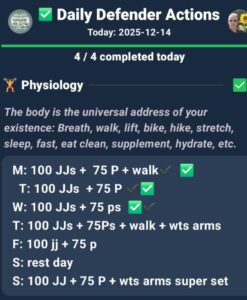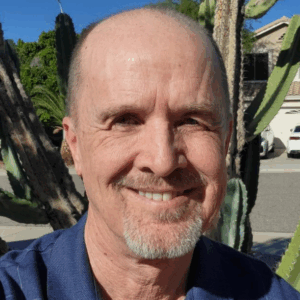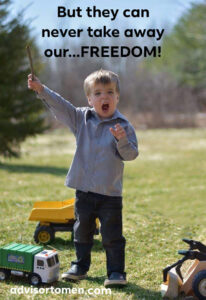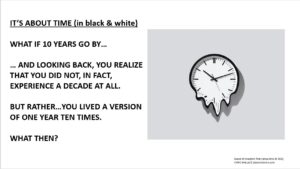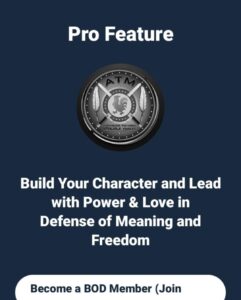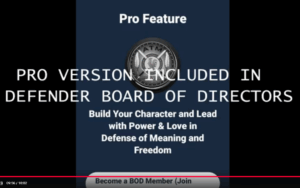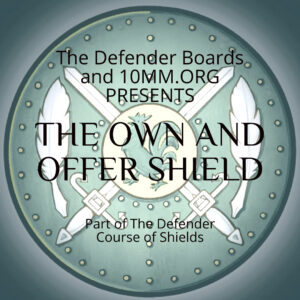MEN WITHOUT CHESTS
In 1943, at the height of World War II, C. S. Lewis published The Abolition of Man and issued a prophetic warning. A culture obsessed with being nice, tolerant, and emotionally agreeable, he argued, would not become more humane. Its men would become hollow, manipulable, and ultimately dangerous. He called them “men without chests.”
By this he meant people who still possess intellect and appetite, the head and the belly, but lack the chest, the trained moral instincts making courage, honor, loyalty, and restraint possible.
The chest is less about sentimentality and more about disciplined emotion aligned with defensible values. It is the part of a man that allows him to recognize and act in alignment with what is right, even under pressure, without needing permission or consensus.
Lewis’s argument was brutally simple. If you debunk inherited moral law, including the accumulated understanding of right and wrong handed down through civilization, mock tradition, and make all values equal in the name of tolerance, you do not encourage free thinkers.
Instead, you produce people governable by fear and approval, who are easily shaped by bureaucracies, ideologies, and emotionally manipulative personalities… in the absence of an embodied moral structure and the capacity to say no.
These are people who can calculate endlessly, explain everything, and justify anything, but who cannot stand, refuse, or sacrifice. Compassion that is detached from hierarchy and moral training becomes cruelty because values and responsibilities are not interchangeable. Some harms must be tolerated to prevent greater ones, not all suffering is equal, and a culture that rewards weakness while punishing strength produces chaos rather than care.
When nothing is objectively noble, the strongest impulse wins. Safety replaces virtue while comfort replaces truth, and fear becomes the organizing principle of society.
This is exactly the cultural soil that produces Nice Guy Syndrome.
Nice Guy Syndrome
The Nice Guy is more or less polite, accommodating, conflict-avoidant, and morally fluent. He knows the language of empathy and inclusion. He can explain why everyone’s feelings matter. But under pressure, he freaks or freezes, appeases or submits. He has not been trained to contain fear or act in defense of values. Lewis would say he has a head and a belly, but no chest.
Where C.S. Lewis diagnosed the philosophical problem, understanding the predictive brain supplies the missing mechanism. Men do not surrender standards because they have reasoned their way to relativism (no universal right or wrong). Rather, they do so because their nervous systems are governed by dread. Such a man prioritizes safety over meaning, approval over truth, and relief over responsibility. That might be worth reading again.
Let us be clear: this is not first a moral failure. It is a physiological one because we are largely run by our nervous systems, with conscious awareness riding along. George Vaillant noted the integrated nervous system (INS) denies, distorts and represses inner and/or outer reality to lessen anxiety and depression (Wisdom of the Ego, 1995).
Children require a mother, a father, and alloparents (grandparents, aunties, uncles, siblings, neighbours, etc.) to mature properly (Sarah Hrdy, Mother Nature, 1999). While no one emerges from childhood emotionally unscathed, it appears that multiple regulated adults distribute emotional load, model different responses to stress, and prevent over identification with a single nervous system. After all, a child experiences family physically before he experiences it intellectually.
A boy does not grow up under ideas so much as he grows up inside nervous systems. Should he be over-mothered and under-fathered, he is exposed too narrowly and for too long to a single emotional field. Without sufficient paternal containment among a wider circle of adult helpers, the child adapts by orienting toward emotional attunement rather than boundary, action, or risk.
Losing a perfectly-imperfect evolved balance countless millennia in the making means the young male learns to manage emotion rather than confront reality. He becomes sensitive, perceptive, and agreeable, but not grounded or decisive. This is why so many modern men are conflict avoidant yet emotionally fluent. They were trained early to regulate others rather than themselves.
Restoring the Chest
This is also what Robert Bly was pointing to in Iron John (1990) when he said that the boy must leave the mother to become a man. Bly was not attacking women or mothers. He was naming a developmental necessity: male maturity requires generational masculinity.
For most of human history, boys became men in the presence of fathers, grandfathers, uncles, cousins, big brothers, and friends. Masculinity was passed along through proximity, shared labor, and lived example. By watching other as well as older men, young males learned how to bear strain, contain fear, and act under pressure.
That transmission began to break down roughly two centuries ago with the industrial separation of home and work. As men left households for offices, factories, and mines, boys were increasingly raised by mothers, institutions, and abstractions. Masculinity became something explained rather than embodied.
Two hundred years later, Lewis names the result: men educated in moral language but untrained in moral capacity. Without that critical generational transition, the boy remains psychologically oriented toward approval and emotional safety rather than purpose and duty. Unknowingly, at an existential level his nervous system projects and defaults to seeking forms of maternal acceptance across his day-to-day life.
This is why virtue cannot be argued back into men. It must be internalized in the body-mind as experience. Moral language collapses when the nervous system has never been taught to tolerate strain without magnifying it into threat. You cannot reason someone into courage if his body interprets conflict as danger. Neither can you lecture a man into backbone when his physiology equates disapproval with abandonment.
Restoring the chest means training men to regulate fear, tolerate tension, and to act without folding when things go awry. Until the body is brought back into order, moral appeals will continue to fail, and Lewis’s men without chests will remain easy to govern, easy to manipulate, and unable to say no when it matters most.
It means rebuilding moral instinct through lived practice, not slogans. This is why my framework begins with physiology. A man who cannot calm his body cannot hold a line. From there comes orientation toward higher meaning, accountability with other men, and responsibility through production. Courage is not a personality trait. It is a conditioned capacity, often felt in the chest.
Dark Tetradians
Lewis warned that a civilization that educates clever cowards will eventually be ruled by tyrants or technicians. Not because people are evil (though some are), but because they are untrained. When nothing is worth dying for, everything becomes negotiable, including human dignity.
Paul Bloom identified empathy as biased, parochial, too easily weaponized, and a poor basis for decision-making. (Against Empathy, 2016). Elevating empathy to highest virtue status means the emotionally expressive gain power, boundaries are framed as cruelty, and resistance decried as a lack of compassion.
Perhaps ten percent of human beings are personality disordered. They have always lived among us though tend to show up differently by sex. It is a mistake to say that dark tetrad personalities (Psychopathy, Machiavellianism, Narcissism, Sadism) lack empathy.
What they typically lack is emotional empathy, not cognitive empathy. They are often highly skilled at understanding what others feel, what motivates them, and where they are vulnerable. That understanding is then used instrumentally rather than relationally.
A nice guy (man without chest) is often high in affective empathy and low in boundaries. They feel others’ emotions intensely and mistake that feeling for moral obligation. Dark tetrad personalities, by contrast, understand what others feel, fear, and desire without sharing that emotional burden.
In a culture that elevates empathy while discouraging courage and moral hierarchy, a dangerous asymmetry develops. The empathetic yield when harried, while the manipulative gain leverage.
The dark tetrad personalities use this asymmetry to identify and exploit vulnerability. These types possess sufficient ego defenses to thrive on chaos and more easily rise in prominence… under weakened masculine order which fails to contain their excesses.
With rank-and-file prosocial males disempowered, Lewis’ predictions come true.
I am not rejecting compassion. I am all for restoring its spine. It’s just that compassion without courage collapses into control. The task now is not to make men nicer, but to make them steadier, braver, and capable of defense. That is what it means to rebuild the chest.
For what is a man, if not a defender. When a male refuses to defend it means someone else must step into the breach and defend for him. This is unacceptable.
We need to build Team Human men of character who thrive using power and love in defense of meaning and freedom. Men who can defend, deliver and decide for the good of us all.
Men with chests.
Questions? Comments?
True and Free…
cw
©2026 CHRISTOPHER K WALLACE, Advisor to Men™
all rights reserved.
Join us in building a Defender Destiny by taking this free course.
https://10mm.org/quad-cours*
Find the new ATM Defender App in your favourite app store…




